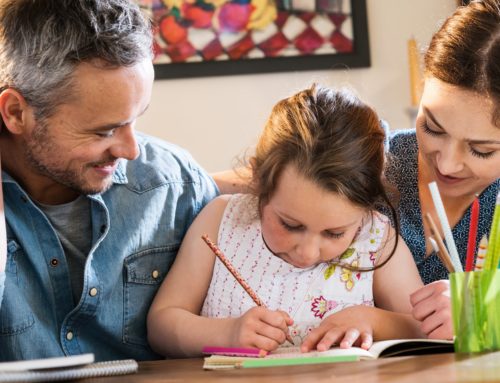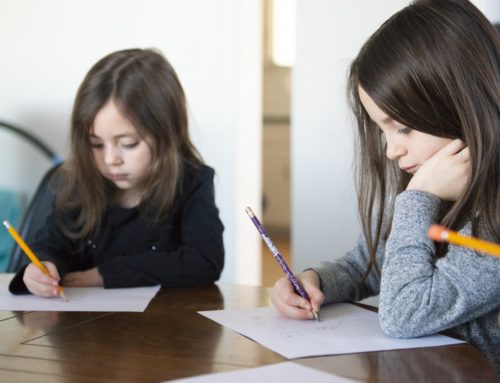Homeschooling children is no small endeavor, and you might be wondering when is the best time to get started. Whether you plan to send your child to a traditional kindergarten or not, the preschool years are important.
Many child development experts will tell you that the early years are when the magic happens. That’s because these are the years when the foundation is being laid for the learning that will happen as your child grows.
The good news is that children are outstanding learners, and in the early years, teaching your child doesn’t have to be formal. It can be both fun and engaging for both of you.
The quick answer to when to start homeschooling is this – it depends on your child. Informal learning happens all day, but you’ll know when it’s time to start a formal homeschooling program because your child will exhibit interest.
How Infants and Toddlers Learn
Before you embark on a homeschooling curriculum, it’s a good idea to understand how young children learn. This will guide your decision, not only on when to get started but also on what program to choose.
In essence, young children learn by playing. That means that you are likely already instructing them simply by getting down on the floor and joining their play.
The great thing about this is that kids don’t even know they’re learning. They are just having fun. Fostering a lifelong love of learning is vital, and the early years are the time to do it.
During the infant and toddler years, learning occurs when children can explore a stimulating, but safe environment. Interactions with caregivers also influence the learning process.
Touching toys, putting them into the mouth, experimenting with textures, and observing the environment are all early learning opportunities you can provide at home.
Likewise, reading books together, having age-appropriate “conversations,” and responding to your child’s cues are other ways you can foster a healthy learning environment.
What Infants and Toddlers Are Learning
One of the best tips on teaching children is to follow their lead. This ensures that they are staying engaged in the learning process and are gathering the skills they need but that also interest them.
The early years are formative, and there are plenty of learning opportunities that arise from everyday things, such as taking your child for a walk, reading books, and visiting the zoo or museum.
Your child is learning about relationships, specifically, trust in others. They’re also learning about their own likes and dislikes and how to cooperate and get an appropriate reaction from their caregivers.
Language and communication is another learned skill at this age. When you listen to your child and interact with them, you are teaching them about conversation skills and the language you speak.
At this age, your child is also learning about their environment. They’re learning sizes, such as what’s bigger and smaller, as well as what their place in the community is (for example, where they live and who they live with).
Early literacy and mathematics are also happening at this age. That includes counting, how many items fit in a container, and storytelling. Coloring sets the stage for later handwriting skills.
Finally, the early years are a time to learn about health and physical fitness. This is done by offering nutritious foods and creating plenty of opportunities for activities, like going to the playground and throwing the ball in the backyard.
At What Age Should You Start?
As mentioned above, there’s no hard rule to this question. Each child learns at his or her own pace. Starting a formal program too soon can hinder a child’s joy of learning, but waiting too long can interfere with kindergarten readiness.
If you’re engaging your child in a variety of opportunities to play, such as dress-up, puzzles, reading books, building with blocks, driving cars, and taking care of dolls, you’ve already started homeschooling.
If you’re planning to send your child to a traditional kindergarten, a formal homeschool curriculum may not be necessary. However, you may find that it guides you toward the skills your child will need to start school.
In a classic preschool setting, formal education can be started in small does with children as young as two years of age. Adding to this as kids reach their third and fourth birthday builds skills and prepares them for the classroom.
Again, let your child guide you. You’ll likely be able to tell when he or she is ready for something a bit more formal than playing together throughout the day.
Laws About Homeschooling
If you plan to send your child to traditional kindergarten, this is likely something you won’t need to worry about. However, if you want to homeschool beyond the early years, it’s important to know the homeschooling laws surrounding that choice.
The laws about reporting homeschooling vary by state. In some states, you won’t need to report at all, while in others rules are stricter and your curriculum and instruction will be regulated.
You must follow the laws of the state in which you reside. That includes the state-mandated subjects that you must teach and the age range at which your child must participate in a formal homeschooling program.
In most states, if you choose to homeschool, the age at which reporting is required is age 6. If you continue to homeschool, you must do so until your child is 17 or 18, unless you enroll them in a traditional school.
There isn’t as much regulation for homeschooling during the preschool years, so that gives you the option of using a formal curriculum if you want to. It also means you can teach your child in other ways if you prefer something less structured.
Ideas for Homeschooling Children
If you’re reading this, it’s likely because you have a young child and you want to be sure he or she is ready for kindergarten when the time comes. Fortunately, there are a whole host of learning opportunities you can engage in together.
Infants learn by observing, so offering a variety of environments is an easy learning opportunity. Take walks around the block, participate in a local library reading program, take infant swimming lessons, or visit a museum.
These ideas may seem over an infant’s head, but they are learning a lot simply by seeing new places. You can also move your play space from room to room in your house, offering new views on a daily basis.
As your child gets older, you can engage their senses with crayons, play dough, sand, and water. Hunt for leaves or bugs at the park or plant seeds and watch them grow.
Young children can also learn early literacy and math skills by helping prepare simple meals and snacks. They’ll learn quantities, size comparisons, and a sense of healthy eating habits.
Reading books is a great way to introduce shapes, colors, and numbers. You can also count and measure items around the house. Singing the alphabet is a great early literacy skill, as is pointing out words in a book as you read them.
Young children love art, so you should also offer plenty of opportunities to draw, paint and glue. Not only will your child be having fun, but they’ll be gaining skills they’ll need in the kindergarten classroom.
Kindergarten Readiness
One of your goals, when you choose to homeschool your young child, is to get them ready for kindergarten. This is true whether you plan to extend homeschooling or you enroll them at the local public school.
Age is one of the biggest factors, and most states require a child to turn five years old by a certain date to attend kindergarten. However, you can wait to start your child until he or she is six years old if you prefer.
Maturity is another guiding factor. Is your child able to sit still long enough to complete a given task? Can they concentrate on short lessons? Do they interact well with peers?
Of course, basic skills are also a consideration when it comes to kindergarten readiness. That includes recognizing letters and numbers, counting, gluing, and cutting. It also means writing and recognizing their name.
Choosing a Homeschool Curriculum
Teaching your child at home doesn’t require a formal curriculum in the early years. However, if you want to try one, there are some things to consider.
The program should be age-appropriate and align with your child’s learning style. That might be hands-on vs. visual learning.
You should also consider your situation. How much time can you dedicate to the homeschooling program, and what budgetary constraints do you have?
Other things to keep in mind are the special needs of your child, where you plan to homeschool, and what values your family holds, be they religious or otherwise.
What’s Your Next Step?
Homeschooling your young child can be very rewarding for both of you. Now that you’re a bit more prepared to get started, let us help you choose the ideal curriculum for homeschooling children in their early years.


